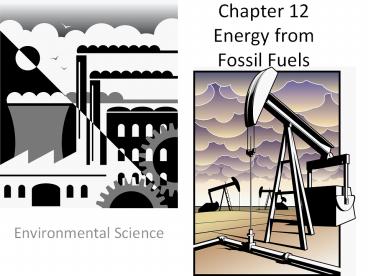Chapter 12 Energy from Fossil Fuels - PowerPoint PPT Presentation
1 / 26
Title:
Chapter 12 Energy from Fossil Fuels
Description:
Chapter 12 Energy from Fossil Fuels Environmental Science * * * * * * * * * * * * * In The Past Disadvantages Electricity from Coal Burning Pollution from primary ... – PowerPoint PPT presentation
Number of Views:284
Avg rating:3.0/5.0
Title: Chapter 12 Energy from Fossil Fuels
1
Chapter 12 Energy from Fossil Fuels
- Environmental Science
2
In The Past
3
Consumption
US energy
4
(No Transcript)
5
Disadvantages Electricity from Coal Burning
- Pollution from primary energy source of burning
coal, especially CO2 global warming - Coal contains sulfur, mercury and sometimes
radioactive contaminants that when burned enter
our atmosphere to make it to water ways, etc
- Sulfur oxide compounds create acid rain and
acidic soil waterways making it hard on biota - Environmental effects of the mining process also
like habitat alterations, mineral leaching,
erosion, formation of sinkholes, etc - Only 35efficiency of 2ºenergy source
6
(No Transcript)
7
(No Transcript)
8
(No Transcript)
9
OPEC Members
- AFRICA Algeria, Angola, Nigeria, Libya
- S. AMERICA Ecuador, Venezuela
- MIDDLE EAST Saudi Arabia, Iran, Iraq, Kuwait,
Qatar, United Arab Emirates
10
US Oil Production and Consumption
- OPEC Organization of Petroleum Exporting
Countries - Arab Oil Embargo OPEC Arab members blocked
exports of oil to US from Oct 1973 to March 1974
for the US support of Israel in Yom Kippur War - Strategic Reserve
11
Economics of Energy Use
Supply side economic fixes to high energy
prices Increase domestic production Exploratory
drilling Alaska Pipeline Demand side fixes to
high energy prices Decrease consumption CAFÉ
Standards, Fuel efficiency (Corporate Average
Fuel Economy) Conservation goals and energy
efficiency 55 mph speed limits Alternative
energies technological development, tax
incentives and government investments
12
Consumption, Domestic Production, and imports of
Petroleum
13
Hubbart Predictions
- U.S. Oil production would peak (1970s)
- Dependence on OPEC oil will increase
- Oil production will follow a bell-shaped curve
14
Issues of Foreign Dependence?
- Trade imbalances
- Military actions
- Pollution of oceans
- Coastal oil spills
- Variations in cost of purchases
- Threat of supply disruptions
- Limitations of nonrenewable resource
15
What does a barrel really cost?
- 14 in initial costs
- 80 for military support services
- 94 per barrel of oil
16
Other Fossil Fuels
- Natural Gas
- Cost subject to market fluctuation
- Currently have a 50 year supply
- Pipeline dangerous b/c kept
- at high pressure
- Used for heating/furnace
- Can run a modified car, liquified gas
- Made into synthetic oil
17
Other Fossil Fuels
- Coal
- 56 of electricity
- 250 year supply
- Produce more coal than use
- Mining issues?
- Lots of waste (20,000 tons CO2, 800 tons SO2
- Synfuels! (by-products are an issue)
18
Other Fossil Fuels
- Oil Shales and Oil Sands
- Once heated, vapors condensed into something
similar to crude oil - Use/modification extremely impractical at the
moment
19
Issues of Using Fossil Fuels
20
Cogeneration
21
ANWR
- Read Ethics section on page 305-306
- Ive assigned you a side
- Black Pro drilling
- Red Anti-drilling
- Research and have a debate/discussion on Monday
22
Mining Techniques
- Mining is the extraction of valuable minerals or
other geological materials from the earth,
usually from an ore (rock) body, mineral vein or
coal seam - Process mining usually involves first removing
overlying soil and rock (the overburden) and
putting this into valleyfills or tailing piles - Surface mining is more common (98 of metallic
ores) includes Open pit mining (big deep
holes), Strip mining (removing surface layer),
Mountain Top Removal (often used with coal
deposits) - Subsurface Mining including drift mining
(horizontal access tunnels), shaft mining
(vertical) and slope mining - In-situ leaching (uses acids to dissolve the
minerals, usually U) - Tailings are the excess waste rock, minerals and
contaminants
23
Mining Techniques
- Copper Ore is typically the mineral chalcopyrite
(CuFeS2) or sometimes found in malachite mineral
CuCO3Cu(OH)2 - Average grade of 0.6 for Cu ore
- Extractive metallurgy Process pulverize the ore,
solubolize it with acids (leaching) or with
smelting (heating and electrolysis), then isolate
the Cu through redox chemical reactions
24
Coal Mining Reclamation
- Surface mining is common proactive in Wyoming
Reclamation of Wyoming prairies and rolling hills
is often very successful Not as complicated an
ecosystem as those with mountains, forests and
river beds
- Mountain Top Removal mining, often used in
Appalacian Mountains in the East, has been less
suscessful with reclamation - 724 miles of Appalacian streams buried by valley
fills from 1985 to 2001, loss of biodiversity - Nearby streams higher levels of acid content
(sulfur run-off from coal) and thus more
dissolved minerals and heavy metals - Blasting releases dust and flyrock with high
sulfur content causing corrosion of structures - Sometimes no reforestation, possible erosion
issues
25
Surface Mining Control and Reclamation Act
- smackra SMCRA 1977, under President Carter, is
primary federal law regulating env. impact of
coal mining - It requires Coal Companies to
- set up bonds controlled by the government to pay
for reclamation cost estimates - Restore/reclaim land by recontouring/regrading
land to original topography, adding topsoil
and/or nutrients, replanting native vegetation
(fast growing secondary successional species),
monitoring for either 5 or 10 years after - Possible remediations (or fines) for excessive
sulfur (H2SO4 acid) tailings include neutralize
with alkaline/base substances like limestone
(CaCO3), NaOH, NaHCO3, and ammonia NH3, cover
tailings to reduce precipitation contact
bioremediation with sulfate-reducing bacteria
tailings ponds/retention basins to prevent
airborne movement
26
In-situ mining for Uranium
- Injected solutions to dissolve minerals, then
extraction and recrystalization































